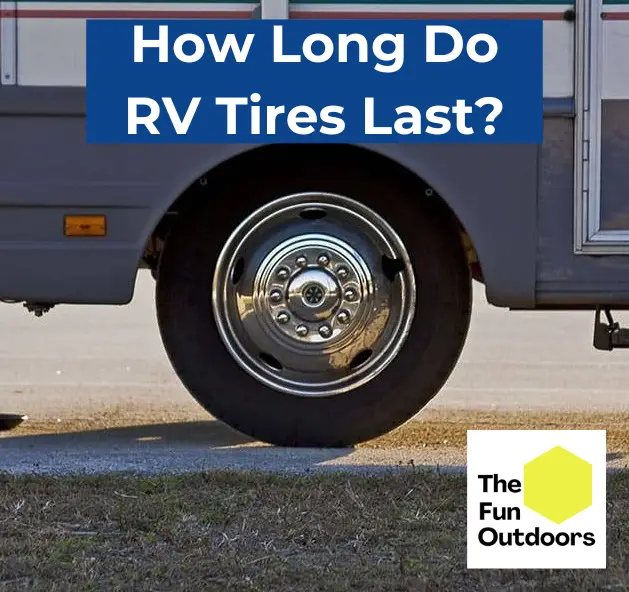When it comes to RV tires, knowing how long they last and when to replace them is crucial for your safety and the safety of others on the road. So how long do RV tires last? RV tire lifespan averages 3 to 7 years but can vary depending on several factors, including the quality of the tire, the conditions in which it is used, and how well it is maintained.
In this article, we will explore how many years and miles you can expect from your RV tires, what factors affect their longevity, and how to know when it’s time to replace them.
Key Takeaways
- Properly maintained RV tires can last between 3 to 7 years.
- Factors that affect RV tire longevity include weather conditions, driving habits, and maintenance.
- Signs that it’s time to replace your RV tires include cracks, bulges, and worn-out treads.
How Many Years Do RV Tires Last?
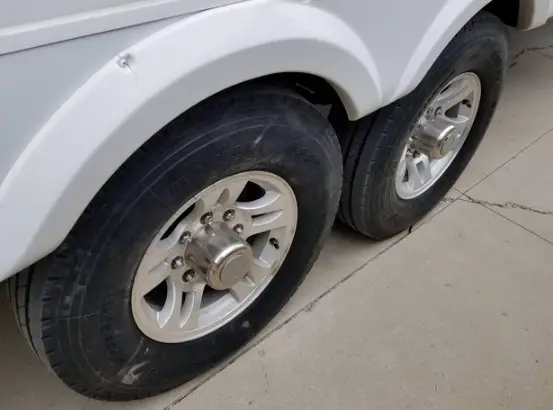
RV tires are an essential component of your vehicle, and it’s crucial to know how long they last to ensure your safety on the road. The lifespan of RV tires depends on various factors, including the quality of the tire, how often you use your RV, and how well you maintain them.
The general rule of thumb is that RV tires can last between three to seven years. However, some tires can last longer, given that you have taken proper care of them and avoided dangerous driving conditions. It’s essential to note that RV tires can deteriorate even faster than that, depending on weather conditions and your driving habits.
One way to determine the age of your RV tires is by checking the date code stamped on the sidewall of the tire. The date code indicates the week and year of manufacture. For instance, if the code reads 2218, it means that the tire was manufactured in the 22nd week of 2018.
It’s also important to note that RV tires can age even if they’re not being used. Tires that are more than six years old should be inspected annually by a professional to ensure they’re still safe to use.
Another factor that affects the lifespan of RV tires is miles driven. The fewer miles you drive, the longer your tires will last. If you’re not using your RV frequently, it’s recommended to cover your tires to protect them from the elements.
In conclusion, the life expectancy of RV tires varies depending on several factors. It’s crucial to inspect your tires regularly, keep them properly inflated, and replace them when necessary to ensure your safety on the road. Use the chart below as a guide to determine when to replace your RV tires.
| Tire Age | Recommended Action |
| 3-5 years | Inspect annually by a professional |
| 6 years | Consider replacing |
| 7+ years | Replace |
How Many Miles Will RV Tires Last?
The mileage that RV tires can last depends on various factors such as the tire’s quality, maintenance, driving habits, and weather conditions. In general, RV tires can last between 10,000 to 50,000 miles before they need to be replaced. However, mileage is not the only factor that determines when to replace your RV tires.
It’s important to note that RV tires rarely meet their mileage limits before their age. This means that even if your tires haven’t seen a lot of miles, you should still replace them every 3 to 7 years. This is because tires can deteriorate over time due to exposure to sunlight, heat, and other environmental factors.
Additionally, the type of RV you have can also affect the mileage that your tires can last. Smaller trailer tires tend to only get 10-15k miles before they might need replacement, while larger motorhome tires can last up to 50,000 miles or more.
To make sure that your RV tires last as long as possible, it’s important to properly maintain them. This includes checking the tire pressure regularly, rotating the tires, and keeping them clean.
By taking care of your RV tires, you can ensure that they last as long as possible and keep you safe on the road.
Factors Affecting RV Tire Longevity
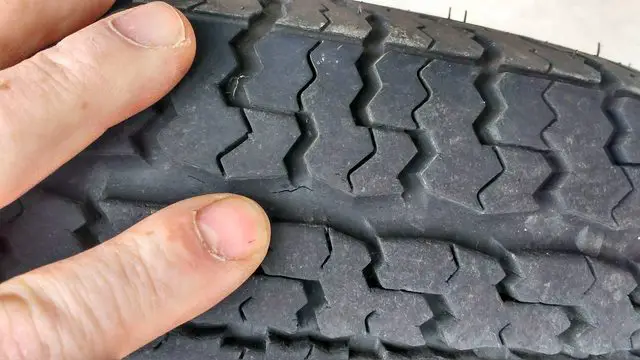
When it comes to the lifespan of your RV tires, there are a number of factors that can affect how long they last. Here are some of the key factors to keep in mind:
Wear and Tear
The wear and tear on your RV tires is one of the most important factors to consider. Over time, the tread on your tires will wear down, which can affect their ability to grip the road and provide traction. It’s important to keep an eye on your tire tread depth and replace your tires when they become too worn.
Sidewall Damage
Another key factor to consider is the condition of your tire sidewalls. Cracks, bulges, and other damage to the sidewalls can compromise the structural integrity of your tires and make them more prone to failure. Be sure to inspect your tires regularly for signs of sidewall damage.
Underinflation
Underinflated tires can also contribute to reduced tire life. When your tires are underinflated, they can become overheated and wear down more quickly. Be sure to check your tire pressure regularly and keep your tires properly inflated.
Driving and Weather Conditions
The driving and weather conditions that your RV tires are exposed to can also affect their lifespan. Driving on rough roads, in extreme temperatures, or in wet or salty conditions can all contribute to increased wear and tear on your tires. Be sure to take these factors into account when assessing the lifespan of your RV tires.
Weight and Support
Finally, the weight and support that your RV tires are providing can also affect their lifespan. Overloading your RV or placing too much weight on one side can cause uneven wear and tear on your tires, which can lead to premature failure. Be sure to distribute weight evenly and avoid overloading your RV to help extend the life of your tires.
Keep these factors in mind when assessing the lifespan of your RV tires. By taking proper care of your tires and being mindful of these key factors, you can help ensure that your tires last as long as possible.
Signs to Replace RV Tires
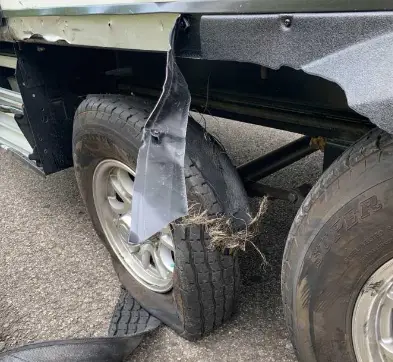
As an RV owner, keeping your tires in good condition is crucial for your safety on the road. Here are some signs that it’s time to replace your RV tires:
- Age: RV tires typically last between 3-7 years, even if they have plenty of tread left. After this time, the rubber can start to break down, leading to cracks, blowouts, and other safety issues.
- Cracks: Check your tires regularly for cracks in the sidewalls or tread. Small cracks may not be a problem, but if they are deep or numerous, it’s time to replace your tires.
- Wear: Inspect your tires for uneven wear or bald spots. This can be a sign of alignment issues or overloading, and it can also increase the risk of a blowout.
- Tread depth: The minimum safe tread depth for RV tires is 2/32 of an inch. Use a tread depth gauge to check your tires regularly, and replace them if the tread is too low.
- Blisters: If you see bulges or blisters on your tires, it’s time to replace them. These can be a sign of internal damage, and they increase the risk of a blowout.
- Too much vibration: If your RV vibrates excessively while you’re driving, it could be a sign of tire problems. This could be caused by a tire that’s out of balance, or it could be a sign that your tires are worn or damaged.
See Related: How To Prevent RV Tire Dry Rot
How To Know When To Replace RV Tires
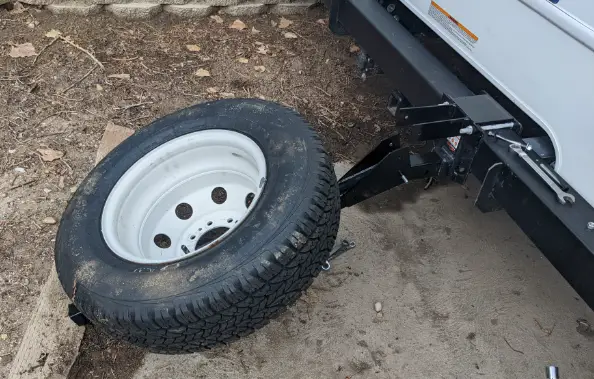
If you’re an RV owner, you know just how important it is to keep your tires in good condition. Here are a few things you can do to determine when it’s time to replace your RV tires:
Check The DOT Number On Your RV Tire
The DOT number on your RV tire can tell you a lot about its age and condition. The last four digits of the number indicate the week and year the tire was manufactured. For example, if the last four digits are “2218,” the tire was manufactured in the 22nd week of 2018. If your tires are more than five years old, it’s time to start thinking about replacing them and inspecting them annually.
Figure Out Your Tire’s Age
Even if you don’t have the DOT number, you can still figure out your tire’s age. Look for a four-digit number on the sidewall of the tire. The first two digits indicate the week, and the last two digits indicate the year. For example, “2515” would mean the tire was manufactured in the 25th week of 2015. If your tire is more than five years old, it’s time consider replacing it.
Ask The RV’s Previous Owner
If you bought a used RV, you should ask the previous owner about the age and condition of the tires. They may have replaced the tires recently, or they may be able to give you an idea of when the tires were last replaced. If the tires are more than five years old, it’s time to start thinking about replacing them.
Check The Manufacturer’s Suggestion
Finally, you should check the manufacturer’s suggestion for when to replace your RV tires. Some manufacturers recommend replacing tires every three to five years, while others suggest replacing them every six to ten years. The manufacturer’s suggestion will give you a good idea of when you should start thinking about replacing your tires.
See Related: How To Prevent RV Hydroplaning
Maintaining RV Tires
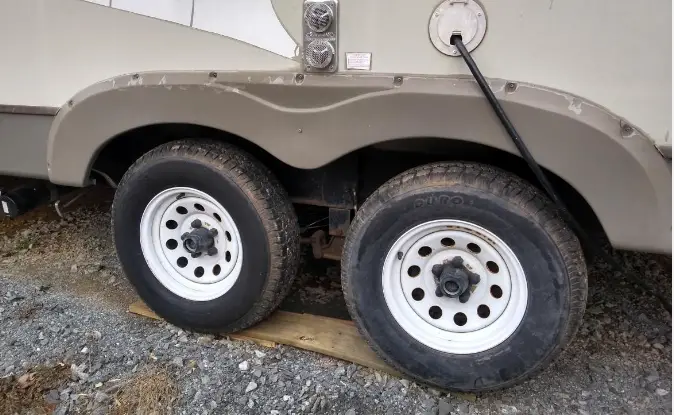
To ensure that your RV tires last as long as possible and perform at their best, it is crucial to maintain them properly. Here are some tips to help you maintain your RV tires:
Tire Maintenance
Regular tire maintenance is essential to ensure that your RV tires last as long as possible. This includes checking the tire pressure regularly, inspecting the tires for damage, and rotating the tires as needed. Make sure that you follow the manufacturer’s recommendations for tire maintenance.
Balance and Alignment
Proper tire balance and alignment are essential to ensure that your RV tires wear evenly and last as long as possible. Make sure that you have your tires balanced and aligned regularly, especially if you notice any uneven wear on the tires.
Protectant
Using a tire protectant can help to protect your RV tires from the elements and extend their lifespan. Make sure that you use a protectant that is specifically designed for RV tires and follow the manufacturer’s instructions for application.
Tire Covers
Using tire covers when your RV is parked can help to protect your tires from the sun’s harmful UV rays and other environmental factors. Make sure that you use tire covers that are designed for your RV tires and that they fit properly.
Make Them Last
By following these tips and taking good care of your RV tires, you can help to ensure that they last as long as possible and perform at their best. Remember to follow the manufacturer’s recommendations for tire maintenance and to have your tires checked regularly by a professional.
See Related: How To Improve Your RV Gas Mileage and What Green Tire Air Caps Mean
Investing in Quality RV Tires
Investing in quality RV tires is one of the most important things you can do to ensure the safety and longevity of your RV. While it may be tempting to go for the cheapest option, investing in quality tires will save you money in the long run by reducing the need for frequent replacements and repairs.
When purchasing new tires for your RV, it is important to consider the following factors:
- Price Level and Initial Investment: Quality RV tires may be more expensive upfront, but they will save you money in the long run by reducing the need for frequent replacements and repairs.
- Original Tires: It is almost always a good idea to replace the factory tires on any RV. Manufacturers tend to use very low-quality tires on motorhomes and trailers, which have a tendency to blow out easily.
- 5th Wheels: If you have a 5th wheel, it is important to choose tires that are specifically designed for this type of RV. These tires will have a higher load rating and will be able to handle the weight of your RV.
- RV Tire Inflation: Proper tire inflation is crucial for the safety and performance of your RV. Be sure to check the tire pressure regularly and inflate them to the recommended levels.
- Warranty: Look for tires that come with a warranty or allow you to purchase one. This will provide you with peace of mind knowing that you are protected in case of any defects or issues with the tires.
Frequently Asked Questions
Class A RV tires typically last between three to seven years. This lifespan can vary depending on how well you take care of them and the driving conditions you encounter.
Class B RV tires also have a lifespan of about three to seven years, depending on factors such as maintenance and driving conditions.
Class C RV tires have a similar lifespan to Class A and B tires, lasting between three to seven years, but can vary depending on driving conditions and maintenance.
It is recommended that you replace your travel trailer tires at least once every seven years, regardless of their condition. Replace them immediately if you notice any signs of wear or damage, such as cracks or bulges.
Pop-up camper tires typically have a lifespan of around three to seven years. This range can vary depending on how well you maintain them and the conditions you encounter while driving.

